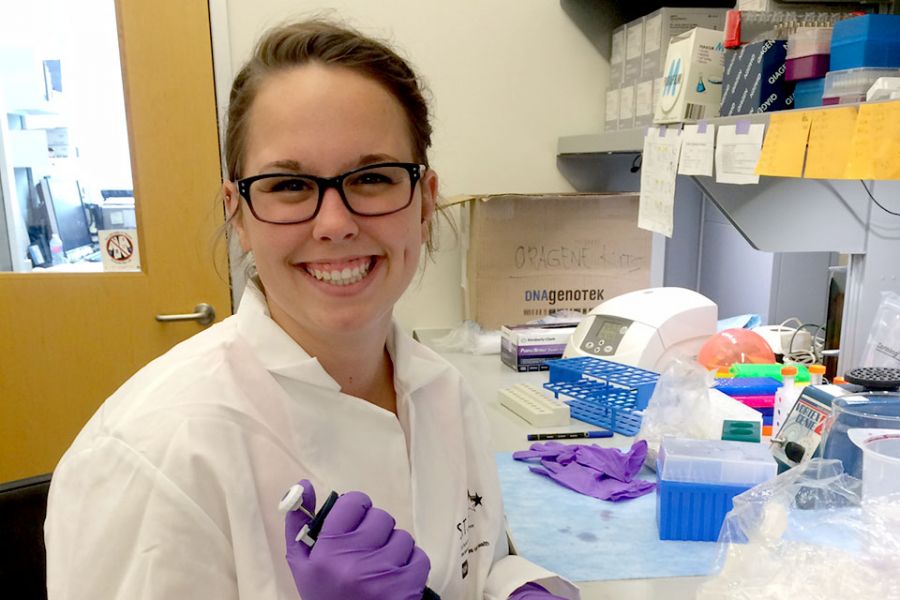When Illinois State junior Kali Riddell arrived in May at the National Institutes of Health (NIH) near Washington, D.C., she had no idea how big of an internship she had landed.
“Everybody I talked to was like, ‘I’m from Princeton’ or ‘I’m from Yale,’” Riddell said. “They asked, ‘Where are you from?’ I was the only one who said, ‘Illinois State.’ That was awesome. I was telling everybody, ‘I’m from Illinois.’”
Internships with the National Institutes of Health are very competitive; applications come in by the tens of thousands every year. Riddell, a communication sciences and disorders major, spent 10 weeks working in the NIH’s Neuroscience Research Center under Dennis Drayna, chief of the Laboratory of Communication Disorders Section. Drayna’s lab is looking for evidence that stuttering is a biological disorder, rather than a psychological or social disorder.
“We almost never take students who don’t have a background in genetics or biochemistry, especially laboratory experience. Kali was the exception,” Drayna said. “We never had someone who was in the middle of training in speech language and pathology that wanted to come to a genetics lab.”
Riddell came across Drayna’s lab during an online search of summer internships. What got her attention was the opportunity to attend the National Stuttering Association Conference through the internship. In anticipation, she joined the National Stuttering Association Chapter at Illinois State.

Kali Riddell, here with Dennis Drayna, said the highlight of her internship was attending the National Stuttering Association Conference.
“Going in I was really nervous, but everyone in the lab was really helpful,” Riddell said. “Everyone took the time to teach me, and I was able to teach them because they didn’t have the clinical background that I had.”
Riddell was stunned at the vast size of the National Institutes of Health, a university-like campus composed of 27 different institutes. She was particularly amazed by the Clinical Center, which houses hundreds of patients from all over the world.
The goal of Drayna’s lab is to determine whether stuttering is caused by mutations in genes. Riddell was in charge of getting the saliva samples of stuttering patients, purifying the DNA, and preparing the samples to be sequenced and genotyped (a process of comparing the genetic makeup between individuals). Riddell had taken those samples during the National Stuttering Association Conference.
“At the conference, I was able to talk to people and learn what it is like to live with a communication disorder, and that was something that will be very useful for me in my future,” Riddell said.
Riddell had several people express their appreciation for the research she was doing: “That just really touched my heart and made me really excited to go to graduate school and work in that field.”
This fall Riddell is completing an independent study with Illinois State Associate Professor Jean Sawyer. Riddell will be using the knowledge she gained in the internship and a poster to present on stuttering and genetics to fellow students. She had already presented the poster at the conference to postgraduates, interns, NIH researchers, and students from other colleges.
“I felt really proud being able to represent Illinois State,” Riddell said.
For information about Illinois State’s Washington, D.C., internship program, visit Research and Sponsored Programs’ website.
Natalie Sammarco, a University Marketing and Communications editorial intern, can be reached at nrsamma@IllinoisState.edu.
To read more about research and creative expression at Illinois State University, follow @ISUResearch on Twitter and look for the inaugural issue of the Redbird Scholar. The University’s new biannual magazine focused on faculty and student research will be published in September in print and online at IllinoisState.edu/RedbirdScholar.

